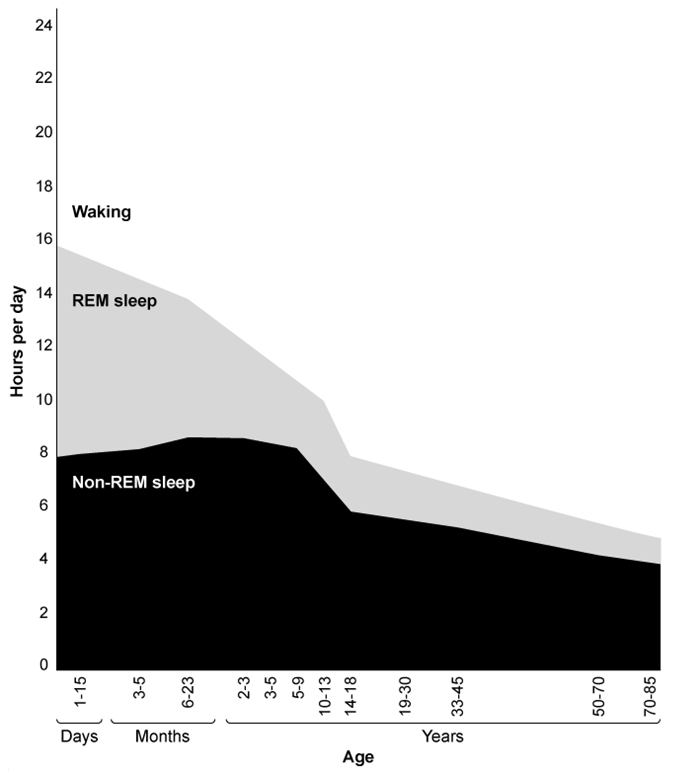Passage
Across the lifespan, mental and physical health depends on adequate sleep. Extensive research suggests that sleep needs and characteristics change throughout an individual's life (Figure 1) .
 Figure 1 Average hours of rapid eye movement (REM) and non-REM sleep for different age groups across the lifespanChronic sleep deprivation acts as a physiological stressor and can have a multitude of short- and long-term negative health consequences. Studies show that over 30% of adults get less than the recommended minimum of 7 hours of sleep per night, putting them at greater risk for metabolic disorders (eg, obesity, diabetes) , cardiovascular disease (eg, high blood pressure, stroke) , and emotional disorders (eg, anxiety, depression) . Sleep deprivation is also associated with impaired cognitive functioning, decreased work performance, and an increased risk of accidents.However, the guideline that adults sleep at least 7 hours per night does not account for the considerable variation in individual sleep needs. Research suggests that some individuals, known as "long sleepers," require an average daily sleep duration of more than 9 hours, while "short sleepers" require an average daily sleep duration of less than 6 hours. One study found that biological night duration (established by one's circadian pacemaker or "master clock") appears to be a few hours shorter for short sleepers as compared to long sleepers. Other studies suggest that short sleepers regularly sleep less than 7 hours without any apparent negative consequences due to one or more genetic mutations, such as a mutation on the DEC2 gene (also known as BHLHE41) , which codes for a transcription factor involved in regulating circadian rhythms.
Figure 1 Average hours of rapid eye movement (REM) and non-REM sleep for different age groups across the lifespanChronic sleep deprivation acts as a physiological stressor and can have a multitude of short- and long-term negative health consequences. Studies show that over 30% of adults get less than the recommended minimum of 7 hours of sleep per night, putting them at greater risk for metabolic disorders (eg, obesity, diabetes) , cardiovascular disease (eg, high blood pressure, stroke) , and emotional disorders (eg, anxiety, depression) . Sleep deprivation is also associated with impaired cognitive functioning, decreased work performance, and an increased risk of accidents.However, the guideline that adults sleep at least 7 hours per night does not account for the considerable variation in individual sleep needs. Research suggests that some individuals, known as "long sleepers," require an average daily sleep duration of more than 9 hours, while "short sleepers" require an average daily sleep duration of less than 6 hours. One study found that biological night duration (established by one's circadian pacemaker or "master clock") appears to be a few hours shorter for short sleepers as compared to long sleepers. Other studies suggest that short sleepers regularly sleep less than 7 hours without any apparent negative consequences due to one or more genetic mutations, such as a mutation on the DEC2 gene (also known as BHLHE41) , which codes for a transcription factor involved in regulating circadian rhythms.
-Based on the description in the passage, should an individual who is a "short sleeper" be diagnosed with a sleep-wake disorder?
A) Yes, because sleeping less than average is considered a sleep disturbance
B) Yes, because diurnal circadian rhythms are affected
C) No, because daytime functioning is not impaired
D) No, because the causes of sleep-wake disorders are psychological, not genetic
Correct Answer:
Verified
Q47: Passage
Before memories have been consolidated they are
Q48: Passage
Across the lifespan, mental and physical health
Q49: Passage
Before memories have been consolidated they are
Q50: Passage
Across the lifespan, mental and physical health
Q51: Passage
A common misconception in medicine is that
Q53: Passage
The highly addictive nature of cigarettes can
Q54: Passage
The highly addictive nature of cigarettes can
Q55: Passage
The highly addictive nature of cigarettes can
Q56: Passage
Across the lifespan, mental and physical health
Q57: Passage
Before memories have been consolidated they are
Unlock this Answer For Free Now!
View this answer and more for free by performing one of the following actions

Scan the QR code to install the App and get 2 free unlocks

Unlock quizzes for free by uploading documents